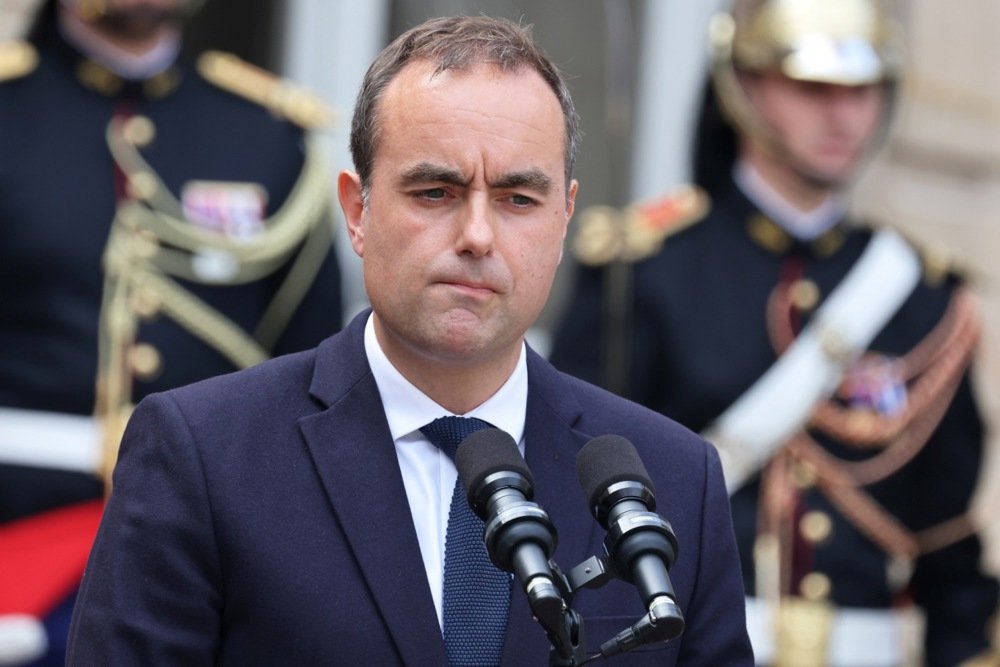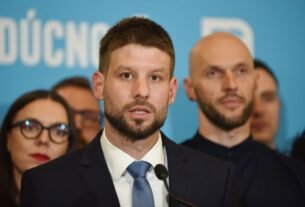PARIS – France’s new prime minister Sébastien Lecornu wasted no time after his appointment on Tuesday, opening budget talks with party leaders in a battle that could make or break his tenure.
President Emmanuel Macron made clear his mission as he named his fifth head of government in just two years: “Consult political forces in parliament to secure a national budget.”
The message landed. At his brief handover ceremony with François Bayrou after he resigned, Lecornu pledged “ruptures” in both style and substance.
The budget must be signed off by 31 December, but the new prime minister would ideally like to have outlined the main points before his speech presenting the new government’s policy guidelines on 2 October.
Lecornu comes from the so-called central bloc: four centrist and liberal-right parties grouped around Macron, and also the political home of Bayrou. Together, they hold just 210 of the 577 seats in parliament.
“Since it does not have a majority,” the bloc “needs to broaden out,” confirmed MP Erwann Balanant, a member of Bayrou’s Democratic Movement (MoDem), speaking to Euractiv. The question is to whom, and on what terms?
Shoring up the right flank
Lecournu’s first step is to lock in the loyalty of the centre-right, especially Les Républicains (LR), which is also his former party.
Nearly half of the party’s MPs refused to back Bayrou in last week’s confidence vote, wary of being tied to a deeply unpopular prime minister with the spectre of snap elections looming.
On Thursday, he invited centre-right leaders for breakfast at Hôtel Matignon, his official residence, before paying a symbolic visit to former President Nicolas Sarkozy — a specific nod to LR.
“We’re not going to give mouth-to-mouth to someone who’s decided to drown,” said LR MP Pierre Cordier ahead of the confidence vote.
On Tuesday night, LR’s political bureau laid out conditions: a formal “government contract” to avoid accusations of selling out, according to LR parliamentary leader Laurent Wauquiez.
Their three red lines: cutting public spending, tougher security and immigration measures, and rewarding work over “welfare dependency.”
Macron’s man to save Macron
PARIS – France’s fifth prime minister in two years is a long-time confidant of President…
4 minutes
The left ups the ante
Yet, those priorities clash with the Socialist Party (PS) demands. “We want recovery, not austerity. Fill the coffers, not drain them for the wealthy,” PS lawmaker Estelle Mercier told Euractiv.
The socialists are open to talks, but on very different terms. Their plan counts €26.9 billion in new revenues, largely from taxing “big fortunes and big corporations.” The centrepiece is a 2% levy on assets above €100 million, dubbed the ‘Zucman tax’ after the French economist Gabriel Zucman.
That would be paired with €14 billion in savings by trimming corporate subsidies, without hitting workers or public services.
“To be credible, we need a softer deficit-reduction path than Bayrou’s, about €120 billion over five years,” said MEP Aurore Lalucq of the centre-left Place Publique party. “What worries Europeans is less France’s deficit than its political instability.”
Should their demands not be met, PS leaders say they are ready to bring down the government, putting dissolution of the National Assembly, or even Macron’s resignation, back on the table.
“We’re not afraid of the ballot box,” said Mercier. The party’s national bureau has already set up an electoral commission to prepare candidate lists for potential snap elections.
“The president must choose between his ego and providing stability,” Lalucq warned.
Marine Le Pen, for her part, seems determined to put an end to Macron’s policy, repeatedly calling for a new dissolution. On Wednesday evening, the leader of the far-right National Rally explained that it was “necessary to allow elections.
For Lecornu, the challenge is finding the narrow path to compromise, or risk his close ally Macron being thrust back into the frontline.
(mm)




